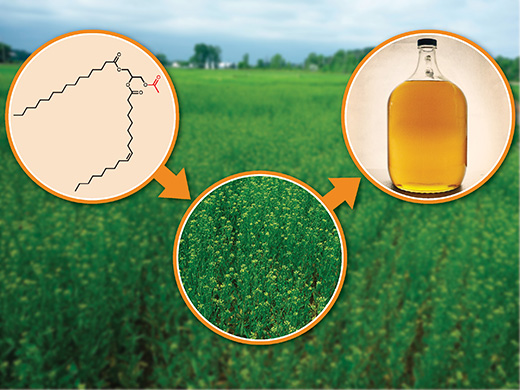Biochemist Studies Oilseed Plants for Biofuel

Complete the form below to unlock access to ALL audio articles.
Timothy Durrett, assistant professor of biochemistry and molecular biophysics in the College of Arts & Sciences, and collaborators at Michigan State University and the University of Nebraska, Lincoln have modified Camelina sativa — a nonfood oilseed crop — and produced the highest levels of modified seed lipids to date. By modifying the oilseed biochemistry in camelina, the researchers have achieved very high levels of an oil with reduced viscosity and improved cold temperature characteristics.
The goal of the research is to alter oilseeds to produce large amounts of modified oil that can be used as improved biofuels or even industrial and food-related applications.
"Reducing our dependence on fossil fuel-derived carbon is always good," Durrett said. "Using alternative sources of fuel is the obvious way to reduce our dependence. But even other applications, such as using it for lubricants or as feedstocks for the chemical industry, would help reduce our dependence on fossil-derived carbon."

Camelina can grow on poorer quality farmland, needs little irrigation or fertilizer, and produces seeds that can provide gallons of oil, Durrett said. It also can be rotated with wheat and could become a biofuel crop for semi-arid regions, including western Kansas and Colorado.
The camelina genome was recently sequenced, which has greatly helped Durrett and collaborators as they improve camelina's oil properties to produce low-viscosity oil — the kind of oil needed for biofuel. By modifying the oilseed biochemistry in camelina, the researchers were able to get very high levels of the modified oil, which are called acetyl-TAGS. In the best camelina lines, about 85 percent of the oil was comprised of the modified acetyl-TAGs.
One of the team's goals is to make commercial products using oils from the engineered plants. The researchers are analyzing these oils because their acetyl-TAGs possess unusual structures and have high value-added properties.
"The basic problem is that most of our oilseed crops — such as canola or soybean — produce just a few fatty acids because we use them for nutritional needs," Durrett said. "That's great for a source of food, but makes doing any sort of chemistry more complicated."
The researchers think that camelina producing acetyl-TAGs is a renewable resource with potential industrial uses, including plasticizers, biodegradable lubricants and food emulsifiers.
"The food industry uses similar compounds already," Durrett said. "What we need to do is first of all see if our oil is safe and can match those specifications. Probably one of the most valuable parts of this research is that we can generate meaningful data sets because of the oil's properties and we can learn more about the oil itself and what it can do."

